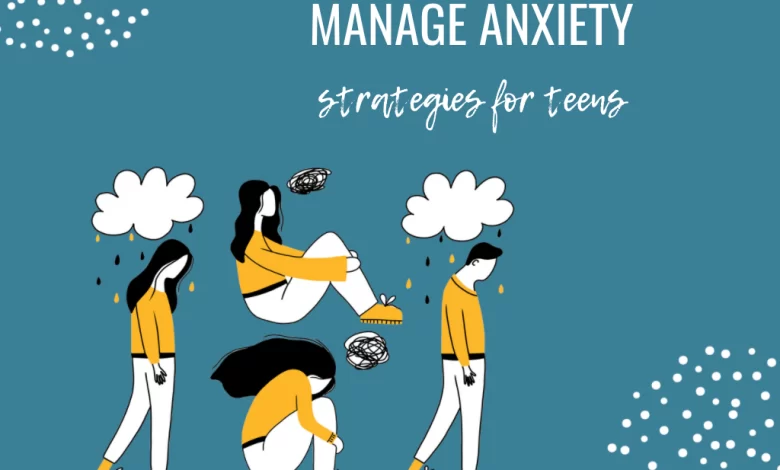Understanding and Managing Teenage Anxiety

Teenage anxiety is a common mental health concern that affects many adolescents worldwide. A treatment program at a group home for teens is a well-designed strategy that includes family programs, academic services, and medication management to help teens facing the pressures and challenges of adolescence, which, combined with hormonal changes, social expectations, and academic demands, can contribute to heightened anxiety levels. In this blog post, we will explore the nature of teenage anxiety, its potential causes, and effective strategies for managing and supporting those experiencing anxiety.
Table of Contents
Understanding Teenage Anxiety
Teenage anxiety refers to excessive and persistent worry, fear, or apprehension that can interfere with their daily life. It is important to distinguish between normal feelings of stress and anxiety that teenagers may experience and anxiety disorders that require professional intervention. While occasional worry and stress are typical, when anxiety becomes overwhelming and interferes with a teenager’s ability to function, it may indicate an anxiety disorder.
Causes of Teenage Anxiety
There is no single cause of teenage anxiety. It is a complex interplay of various factors, including biological, psychological, and environmental elements. Some potential causes of teenage anxiety include:
- Biological Factors: Genetic predisposition and imbalances in brain chemicals such as serotonin and dopamine can contribute to developing anxiety disorders in teenagers.
- Environmental Factors: Stressful life events such as academic pressure, family conflicts, peer pressure, or traumatic experiences can trigger or exacerbate teen anxiety symptoms.
- Social Factors: Social media, peer comparisons, and the constant need for validation can contribute to heightened anxiety levels in teenagers, leading to a fear of missing out (FOMO) or a sense of inadequacy.
- Academic Demands: The pressure to excel academically, perform well in exams, and meet high expectations can create significant stress and anxiety for teenagers.
Managing Teenage Anxiety
- Open Communication: Encourage open and honest communication with teenagers about their feelings and concerns. Provide a safe and non-judgmental space for them to express themselves and share their worries.
- Education and Awareness: Educate teenagers about anxiety and its symptoms to help them better understand their experiences. This knowledge can empower them to recognize when they may be experiencing anxiety and seek appropriate support.
- Healthy Coping Strategies: Teach teenagers healthy coping strategies to manage anxiety, such as deep breathing exercises, mindfulness techniques, regular exercise, and engaging in activities they enjoy.
- Setting Realistic Expectations: Help teenagers set realistic expectations for themselves and guide them in prioritizing their well-being over perfectionism. Encourage a healthy work-life balance and emphasize the importance of self-care.
- Support Network: Encourage teenagers to build a strong support network of friends, family members, and trusted adults who can provide emotional support and understanding.
- Seeking Professional Help: If anxiety symptoms persist or significantly impact a teenager’s daily life, it is essential to seek professional help from a mental health professional. Therapy, such as cognitive-behavioral therapy (CBT), can be highly effective in managing anxiety disorders.
- Stress Management Techniques: Teach teenagers stress management techniques, such as time management, organization skills, and breaking tasks into smaller, manageable steps. These strategies can help alleviate feelings of overwhelm and reduce anxiety.
- Encouraging Healthy Habits: Promote healthy lifestyle habits such as regular sleep patterns, a balanced diet, and limiting caffeine intake. These habits contribute to overall well-being and can positively impact anxiety levels.
Supporting Teenagers with Anxiety
Supporting teenagers with anxiety requires a collaborative effort from parents, schools, and the wider community. Here are some ways to provide support:
- Parental Support: Parents should create a nurturing and understanding environment at home. Validate their child’s feelings and provide reassurance. Encourage self-care practices and actively participate in their child’s therapy or treatment plan.
- School Support: Schools should prioritize mental health education and provide resources for students with anxiety. This can include counseling services, workshops on stress management, and creating a supportive and inclusive school environment. Teachers can also be trained to recognize signs of anxiety and offer appropriate support to affected students.
- Peer Support: Encourage the formation of peer support groups or clubs where teenagers with anxiety can connect with others who share similar experiences. Peer support can greatly reduce feelings of isolation and provide a sense of understanding and empathy.
- Reduce Stigma: Work towards destigmatizing mental health issues within the community. Promote open discussions about mental health, educate others about anxiety disorders, and challenge negative stereotypes. By fostering a supportive and compassionate environment, teenagers with anxiety will feel more comfortable seeking help and support.
- Holistic Approach: Recognize that managing teenage anxiety requires a holistic approach. Encourage teenagers to engage in activities that promote overall well-being, such as hobbies, creative outlets, and spending time in nature. Foster a sense of balance in their lives by emphasizing the importance of relaxation and self-care.
- Monitor Media Consumption: Be mindful of the impact of social media and excessive screen time on teenage anxiety. Encourage teenagers to take breaks from technology, engage in offline activities, and cultivate healthy digital habits. Promote self-esteem and body positivity by discussing media literacy and challenging unrealistic beauty standards.
Different Forms of Anxiety:
Anxiety can manifest in various forms, including generalized anxiety disorder (GAD), social anxiety disorder, panic disorder, and specific phobias. Each type of anxiety disorder may present with distinct symptoms and triggers. It is important to be aware of these differences and seek appropriate support tailored to the specific anxiety disorder.
- Co-occurring Disorders: Teenagers with anxiety often have co-occurring disorders such as depression, attention-deficit/hyperactivity disorder (ADHD), or substance use disorders. These conditions can exacerbate anxiety symptoms and require comprehensive assessment and treatment.
- Impact on Academic Performance: Anxiety can significantly impact a teenager’s academic performance. It may lead to difficulties concentrating, poor attendance, reduced productivity, and test anxiety. Collaborate with teachers and school staff to implement accommodations and support strategies to help students manage their anxiety in an academic setting.
- Avoidance Behaviors: Teenagers with anxiety may engage in avoidance behaviors to alleviate their anxiety. They may avoid social situations, academic challenges, or activities that trigger their anxiety. While avoidance can provide temporary relief, it reinforces anxiety in the long run. Encourage teenagers to gradually face their fears and support them in developing healthy coping mechanisms.
- Medication and Treatment Options: In some cases, medication may be prescribed as part of a comprehensive treatment plan for teenage anxiety disorders. Medication should always be prescribed and monitored by a qualified healthcare professional. It is important to discuss medication’s potential benefits and side effects openly and involve teenagers in the decision-making process.
- Self-Care and Relaxation Techniques: Teach teenagers self-care practices and relaxation techniques that can help manage anxiety. This may include deep breathing exercises, progressive muscle relaxation, guided imagery, journaling, or engaging in hobbies and activities that promote relaxation and enjoyment.
- Long-Term Outlook: With appropriate support and treatment, most teenagers with anxiety can effectively manage their symptoms and lead fulfilling lives. However, it is important to recognize that recovery is a journey, and progress may be gradual. Patience, understanding, and ongoing support are essential components of long-term management.
Teenage anxiety is a prevalent and significant concern that requires attention and support from parents, schools, and the community. By understanding the nature of teenage anxiety, identifying potential causes, and implementing effective strategies for managing and supporting teenagers, we can help them navigate this challenging period of their lives. By fostering open communication, providing education, promoting healthy coping strategies, and seeking professional help, we can empower teenagers to manage their anxiety and lead fulfilling and balanced lives. They can provide a comprehensive assessment, diagnosis, and personalized treatment plan tailored to the teenager’s needs. Let us work together to create a supportive environment that nurtures their mental health and well-being.
For any important information please contact us Email GadgetsNg info@gadgetsng.com
[Button id="1"]


nxediyunlandayi.sYjLfmNmY6Uj
xyandanxvurulmus.1BZXubGK8LVD
anal siteleri wrtgdfgdfgdqq.pdWjO28jd7u4
new porn site hd gghkyogg.KTS1ZVym2Du
best hd porn download ggjennifegg.DSUKxnSUrNs
4k porn dawnload ggjinnysflogg.BeeecywCqgR
fashionflag full hd porn.com fashionflag.zsYysuO5oqZ
goodhere Fetish porn vurucutewet.r29Q1SVULtQ
ladyandtherose Cunnilingus porn backlinkseox.zkGcn2cakzk
jenniferroy 混合ポルノ japanesexxporns.GJk8vS7S4JW
landuse Pregnant porn lancdcuse.tl9RBpshJDv
falbobrospizzamadison Big cock porn jkkıjxxx.fcTmPtMK69g